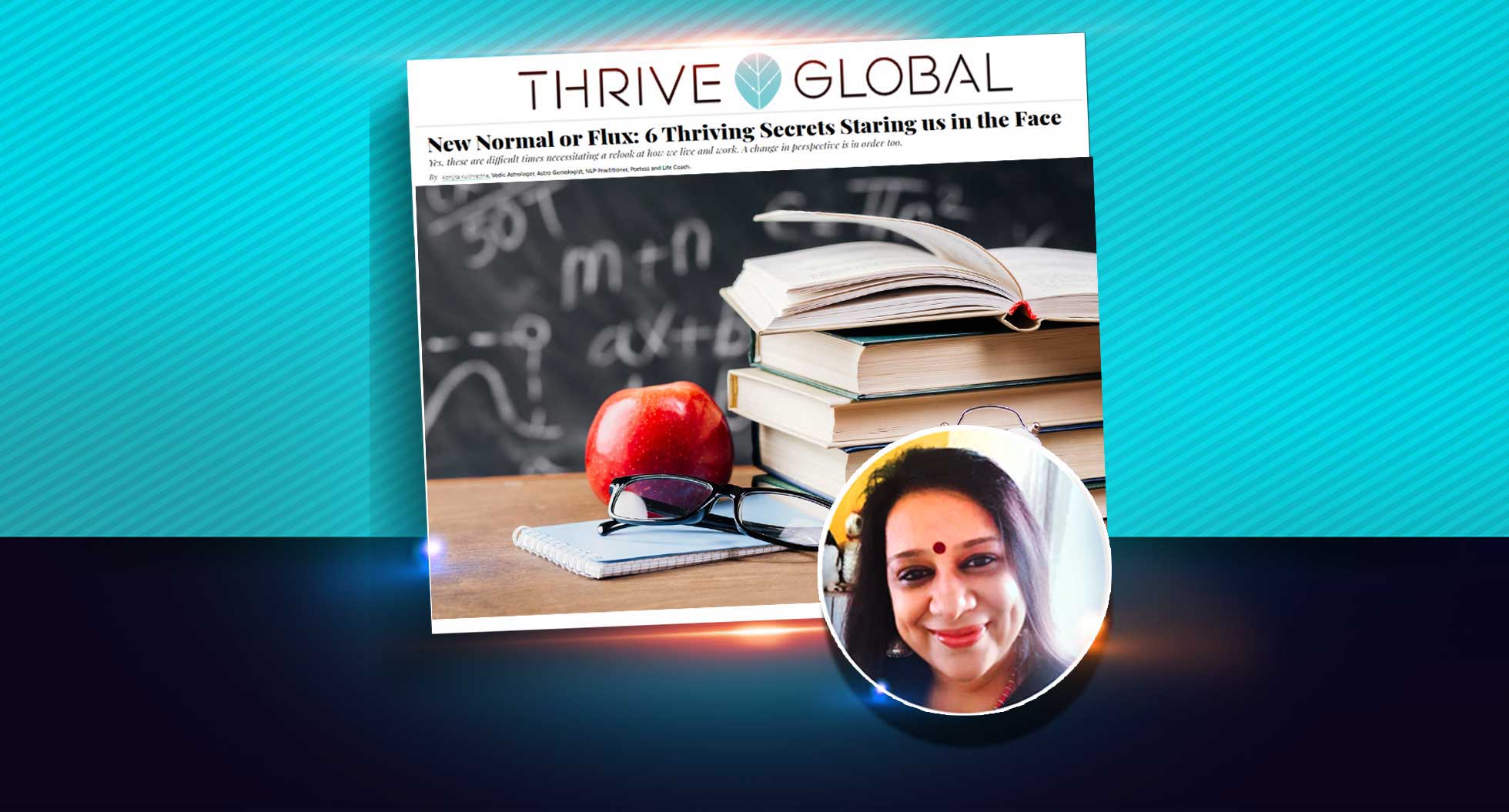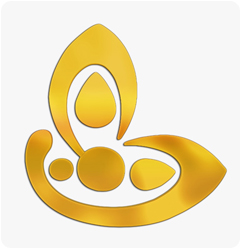ARTICLES: New Normal or Flux: 6 Thriving Secrets Staring us in the Face

Relook at how we “Live" & How we "Work" by Life Coach Abhijita Kulshrestha to help us navigate the new normal.
Read full story by clicking here
New Normal or Flux: 6 Thriving Secrets Staring us in the Face
“Yes, these are difficult times necessitating a relook at how we live and work. A change in perspective is in order too.”
By
Abhijita Kulshrestha, Vedic Astrologer, Astro Gemologist, NLP Practitioner, Poetess and Life Coach.
The first thing that struck me about the new situation (in response to the COVID-19 pandemic) was that everything moves extremely fast in the current times—it is not just the worldwide threat of a contagion, but the equally fast paced need to define the new algorithm, where in the foreseeable future, things will operate in a different manner. Businesses are reconfiguring to operate differently, new rules of work are getting defined and there are new rules for social engagement as well. The older socio-cultural ethos will get replaced by new norms which are better suited to the emerging environment. And these are not necessarily getting better, or are they!
To put things in rudimentary terms, the priority now is survival as can be gathered from the guidelines being offered by governments across the world. For the dearth of a cure, isolation is required and so is shunning of hundreds of artificial needs and wants that have been thrust upon us by a consumerist culture. It is like going back into time where staying alive meant a lot.
Many years ago, I remember being filled with despair upon realising that even in a world where science has made enviable progress, life expectancy in the African nation of Tanzania was at a mere 46 years! It is better now as statistical data suggests (the Central African Republic is at the bottom now with 52 years or so).
Today with the Coronavirus steamrolling its way even through the most powerful economies—affecting the entire population in one way or the other, any other data seems irrelevant suddenly and the only thing that matters is survival. If we manage to beat the virus, the economic downturn still stares us in the face.
So in a time where uncertainty about the future, fear, anxiety, confinement, stress on resources and added pressure surround, what can you do in order to adapt faster? Even though we are adults with varied experiences behind us, the novelty of this situation may cause us to feel stumped—stunted emotional vocabulary and lack of prior experience may cause difficulty in defining reality.
I am sure there are several instant noodle-like recipes for getting by in these times. But I feel strongly that one needs to check-in with oneself and identify how one is feeling. And simply list the concerns in plain simple language. A well-formed question has the possibility of begetting fair answers.
While some suggestions make tremendous sense, until they get you feeling and thinking differently, it may be a non-starter. Every individual is unique and may need to have personal insights in order to move forward. So here is what I think about the situation, you can take it, leave it, or tweak it to find your island of calm:
1. No, it isn’t the ‘new normal’. It is not set in stone, nothing ever is. At best, we are in a state of flux—with little information, inadequate systems and struggling administrations that weren’t prepared for such a catastrophe. Everyone is trying their best.
2. The digital world has ensured that everyone is capable of putting their two cents ‘out there’. I choose to access verified and accurate, fact-oriented sources. I shun the fear mongers, the drama drum-uppers, the suckers for scandal and the doomsday voices. I also choose to consume some media that has lightness about it.
3. Sanity and balanced thinking is important—whether it becomes a great crisis or resolves in a good measure of time, and I can ensure these important things by being in touch with reality and accepting that:
* There is a problem with grave ramifications and I must do my part.
* It will have consequences:
Physical—I need to do more on my own, handle more chores, look after my physical health and stamina in order to accomplish all that now rests on my shoulders.
Social—Isolation and social distancing may redefine leisure, exchange of information and the vital trust factor as well.Financial—The world economy has taken a heavy battering with lockdowns and sealing of cities affecting any kind of trade or economic activity. It will have a bearing on the capacity to earn and capacity to pay as well. It would make sense to work with personal resources in a prudent manner and as best as possible. It will have a bearing on the capacity to earn and capacity to pay as well.
Emotional and mental—It is quite logical and expected to experience some level of anxiety and apprehension for even the best of folk. Times are uncertain and it can lead to spells of frustration. Working from confined spaces can cause behaviour changes, if not acknowledged, understood and handled. A crisis of these proportions has not happened before and it will take what it takes, in order to come to a resolution.
4. It makes great sense to have something reassuring of continuity without creating a false blanket. This holds especially true for those who derive much of their identity from work. Having a semblance of routine helps to hold on to something familiar. Keeping a sleep cycle, meal times, simple workouts and clean media consumption habits can keep one grounded. If the world as one knew it, flips in a week, it can lead to a lot of insecurity and a sense of loss of control. Even if you can devote some time to do what you are good at, or have been doing as a daily practice previously, it will help you keep settled.
5. It helps to adjust the perspective: Perspective literally means how I see things. On an average, even though I may not step out for a few days, my comfort stems from acknowledging that I have the freedom or the choice to go where I want to. It is a ‘mental construct’ that I rely on for peace and comfort. If I change my perspective/ mental constructs now to define that the value of safety has climbed above that of freedom and choice there is less resistance—I use the highly prized freedom to choose ‘safety’ above all else.
6. Living in gratitude is a good way—not occasionally but as a daily practise. For the shelter, food, loved ones, and good health. The home may seem small compared to the big wide world outside—but the reality is that most people work from cubicles and limited office spaces at best so this should definitely not be a problem.
Keep constructively engaged, check-in emotionally with yourself daily and do what works for you.
- Published on April 25, 2020

Abhijita Kulshrestha,is a Senior Director, Astrologer, Life Coach & Gemologist with Gemstoneuniverse. She is a PGA and GIA certified Astro-Gemologist with additional qualifications from prestigious institutions like SSEF .Abhijita is essentially a communication professional and holds a Master’s degree in Mass Communication and Journalism besides being a NLP practitioner. Prior to her soul-level engagement with the world of Vedic astrology, gemstones and association with Gemstoneuniverse, she had a long stint in 'word smithy’! She’s had professional stints at Mudra institute of Communications, Ahmedabad (MICA); RK Swamy BBDO, Bangalore and Times of India. She is a published author at Huffingtonpost and Entrepreneur and has been featured in several international publications of repute. More.
Which is the Most Powerful Gemstone Choosing Method?
What Kind of Problems can Gemstones & Astrology Solve? Can Gemstones help me achieve my Goal.
The Gemstoneuniverse Core Team
Related helpful Links
|
Is it possible to have no results from Gemstones/ Gem Therapy? |
||
© Gemstoneuniverse- All rights reserved
Gemstoneuniverse-The Gold Standard In Planetary Gemology.

Deo Amabiles Et Hominibus- Pleasing to God and to Men.


